Renting Silence
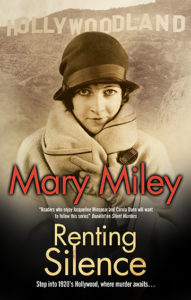 Renting Silence is the latest mystery in the Roaring Twenties series. Available in hardcover in the U.K., Australia, and New Zealand from August 31, 2016. Available in the U.S. in hardcover and e-book from December 1, 2016. Paperback to follow on September 1 . . . http://severnhouse.com/book/Renting+Silence/8708
Renting Silence is the latest mystery in the Roaring Twenties series. Available in hardcover in the U.K., Australia, and New Zealand from August 31, 2016. Available in the U.S. in hardcover and e-book from December 1, 2016. Paperback to follow on September 1 . . . http://severnhouse.com/book/Renting+Silence/8708
Reviews:
“Readers will welcome this third showcase for a valiant heroine with a shady past.” –Kirkus, 10/1/16
“In Miley’s highly entertaining third mystery set during the 1920s (after 2014’s Silent Murder), Hollywood “script girl” Jessie Beckett draws on her education in the school of hard knocks as well as her years in vaudeville to track down the killer of a young woman with a taste for blackmail. . . . The reader gets a strong sense of what life was like if you were from an outsider group or broke Hollywood’s moral code in public. A middle-of-the-night encounter with the Ku Klux Klan is particularly chilling. All the details of her journey not only advance the story but are fascinating in themselves.” –Publisher’s Weekly, 10/17/16
” . . . Set in Jazz Age Hollywood, with cameo appearances by famous stars and stars in the making, along with the slightly shady (but delicious) David Carr from the previous two books, this series’ third instalment zips along with energy. . . . A little sparkle, a hint of sex, some wily Prohibition-era shenanigans, and one smart cookie in the lead make this a great read.” –Booklist, 10/15/16
“VERDICT: With a well-developed and surprising plot twist, an appealing, resourceful amateur detective, and fascinating period details, this entertaining historical will delight fans of Old Hollywood and those who like the 1920s-set mysteries of Suzanne Arruda and George Baxt.” –Library Journal, 11/1/16
“Miley’s third Roaring -20s mystery delivers more zippy entertainment that taps into the spirit of the time when Hollywood’s silent film stars had audiences swooning and vaudeville acts traversed the country via rail.” https://historicalnovelsociety.org/reviews/renting-silence
Is your book club reading RENTING SILENCE? Consider posing these questions:
–Did you hear stories from your grandparents about the Roaring Twenties? Prohibition? Women’s rights? How did they correspond to the circumstances in RENTING SILENCE?
–What parallels do you find between Prohibition of alcohol in the 1920s and today’s prohibiting of recreational drugs? Do you think the government should prohibit or regulate alcohol, recreational drugs, medicine, cigarettes, or other items?
–Some historians believe the women’s movement made its greatest advances in the 1920s. What evidence for this did you find in RENTING SILENCE? What examples of limitations on women did you notice in the story? What could Jessie do or not do back then that we take for granted today?
–Vaudeville began in the 1870s and reached its height in the 1920s when this story takes place. It declined in the 1930s and was gone by the 1940s. Why did this popular form of family entertainment disappear?
–The Roaring Twenties was a virulently racist era, the height of the Ku Klux Klan in both northern and southern states, and a time when anti-black, anti-Catholic, anti-immigrant, anti-Semitic, anti-Asian, and anti-gay sentiments were universal. What makes Jessie more open-minded than the typical American?
–What special difficulties does Jessie face when it comes to discovering who killed Lila Walker? If the investigation happened today, what differences would we find in the story?
–Could the story have happened today? How would it have changed?
Opening chapter of Renting Silence
CHAPTER ONE
Filming silent movies is noisy work—directors shouting instructions through megaphones, cameras grinding away like machine guns, studio musicians playing the mood from the corner—which is why I was perplexed when I walked onto the set of Little Annie Rooney that morning and found it frozen in silence. Actors, electricians, makeup artists, grips, carpenters, script girls, and cameramen stood motionless, as if drawing a deep breath would shatter a spell. Only one person gave life to the scene, and all eyes were on her. Mary Pickford, “America’s Sweetheart” and the star of the film, was slowly pacing the edge of the set, her head down in fearsome concentration.
I looked to Director William Beaudine who motioned for me to stay where I was. He waited until Miss Pickford faced away from him before gliding to my side, so his movement wouldn’t distract her.
“A note said Miss Pickford wanted to see me on the set,” I whispered. “Maybe I’d better come back later?”
Tall and stick thin, Beaudine had to bend to get close to my ear. “Hang on a minute, Jessie. This is the last take before we break.”
One glance at the chalkboard in a young assistant’s hand raised my eyebrows. Sixteen takes? That was a lot, even for a perfectionist like “Re-take Mary Pickford.”
“I could strangle Rudolph Valentino,” the director whispered, almost to himself. “He barged in here, broke her concentration. She hasn’t—”
Miss Pickford stopped and lifted her chin. “I’m ready.”
The scene lurched to life. “Hit ‘em once!” shouted Beaudine and the set was instantly flooded with silvery light from an array of Kleigs, baby spots, and barrel lights. “Camera!” Cameramen cranked up their Mitchells, and the four studio musicians in the corner began playing a gloomy number to set the mood. They were shooting the tearjerker part, where Little Annie learns her policeman father has been killed in the line of duty.
As I watched, thirty-three-year-old Mary Pickford, playing a twelve-year-old girl, scampered out from her hiding place under the table, ready to surprise her beloved father with his birthday cake, only to find herself face to face with a policeman sent to deliver the tragic news. Her expression started at mischievous and slid rapidly past puzzlement, confusion, disbelief, denial, futile hope, and horror, only to end with heart-rending tears. It was an astonishing display of acting skill. In all my years in vaudeville, I had never seen the equal. No wonder she was the most famous actress in the world! I hoped everyone in the audience would have hankies in hand—I was misty-eyed myself. The scene reminded me all too forcefully of having been orphaned myself at the same age.
“Cut! Good work, good work, everyone,” called Beaudine. “No more shooting for now, boys and girls. We’ll break for lunch, and well deserved it is. Take a whole hour.”
A solemn Mary Pickford came over to exchange a few words with Beaudine. Catching sight of me, she gestured to one of the simple wooden chairs on the set, meaning that she would be with me shortly.
I sat down and swung my legs. The seat of the chair was high, maybe three inches higher than normal. I’m small—just over five feet, the same height as Miss Pickford—but I can’t usually swing my legs in a chair. I studied the wooden kitchen table. It was made to the same scale, a little higher than typical.
Mary Pickford walked over and sank into the chair beside me. “What are you smiling at, Jessie?”
“I just realized what you are doing,” I said, awed by her mastery of the craft. “With the furniture, I mean. The whole set is over-large, isn’t it? And that policeman who delivered the bad news, he was very big and tall.”
Suddenly she was Little Annie Rooney again, grinning like a youngster caught up in mischief. She swung her feet too. “When I’m doing a young role, I always hire tall actors. They make me seem smaller by comparison. A couple extra inches on the furniture don’t hurt either.”
“I saw the final take. You were wonderful.”
You’d have thought I’d insulted her. Her shoulders slumped, her grin fell away, and her honey-colored ringlets bounced as she shook her head. “Thank you, but I wasn’t. And I had it! I really had it!” She slapped the table for emphasis. “Before Rudy walked in, I was twelve years old. When he left, I couldn’t get it back. No matter how hard I tried, I just couldn’t get it back.”
There was nothing I could say. The scene had looked great to me, but what did I know? I was just a lowly assistant script girl new to Hollywood, having been hired by Mary’s husband, Douglas Fairbanks, a few months earlier.
“I’m not blaming Rudy,” she went on, more to herself than to me. “I invited him to stop by the set any time and say hello, bless his heart, and that’s all he did. But it distracted me. It was my fault entirely. My fault.” She swung her legs a little longer, sighed, then looked toward the twin cameras. “Oh, Rob!” she called. “Rob Handler!”
One of the cameramen turned at the sound of his name and nodded that he had heard. Pulling a reel of film off the Mitchell, he methodically packed it in a soft case before joining us in the middle of the set.
“Have you met Jessie Beckett?” asked Miss Pickford.
The cameraman nodded. “I’ve seen her around,” he said, then turned to me. “You’re the girl who used to play vaudeville. I heard how you helped solve those gangster murders last month. Pleased to know you.”
“Rob Handler is one of the finest cameramen at our studio,” she said by way of introduction. “One of the finest in all of Hollywood, actually.”
A wiry, middle-aged man who would have passed unnoticed in a crowd, Handler looked like he’d done a week’s worth of work in the past few hours. His forehead was creased with worry, his eyes heavy with dark circles. The compliment from Mary Pickford brought the merest twist to his lips. He sank onto the hard chair like a marionette with slackened strings.
“You used to play kiddie roles, didn’t you?” he asked, more to be polite than from any real interest.
“Most recently, yes. I was with the Little Darlings for a few years. But I’ve also worked for the Kid Circus, a couple of magicians, a Shakespeare troupe, and a variety of song and dance acts.”
“And now you’re an assistant Script Girl.”
“She’ll be working with Douglas on his new pirate picture. But I was hoping she could stand in for me this afternoon. That
hospital scene we’re shooting uses only my back. If you would, Jessie, that would free me up for a meeting.”
Miss Pickford had mentioned once before that she might want to use me as a double. We were the same size and build, and while my auburn hair was bobbed and her ringlets were long and golden, there were wigs in Costume that would solve that in a jiffy. From the back, we would be indistinguishable. Imagine, me, Jessie Beckett, a stand-in for the incomparable Mary Pickford! Last year’s vaudeville wash-up, when I was turned down at every try-out, had squelched any ambition I might have had about acting in the pictures—I simply didn’t have that sort of talent—but the prospect of this small connection to the woman I idolized thrilled me. My heart beat faster.
“Sure!” I said, too quickly. My excitement crashed as fast as it had soared. I held up my right hand, the one that had been injured a last month when someone I was investigating at Miss Pickford’s request had tried to kill me at the foot of the Hollywoodland sign. Two fingers were still in a splint. “Is this a problem? I’m sure I can get Wardrobe to remove it for the scene.”
“That would be wonderful. I’ll let Beaudine know. Thank you, Jessie.”
I heard dismissal in her voice and stood. “I guess I should go see about costumes . . . ”
“No, no, sit. That wasn’t the only reason I called for you. What I really want is for you to hear Rob’s story. If you don’t mind, Rob, dear, please tell her what you told me yesterday,” she said.
Handler glanced back and forth between us, and I thought for a moment he was going to say he was too tired to speak. Instead he sighed and leaned forward, rested his elbows on his knees, and started to talk in a monotone that brooked no interruption.
“Well, it’s like this. I was called to jury duty for the Ruby Glynn trial,” he began, staring down at his clasped hands. Of course I knew about the Ruby Glynn case. Everyone did. It had been in all the papers. In fact, I was even grateful to Ruby Glynn for making me old news when her own sensational trial had pushed me and the Hollywood gangster murders off the front page. But I hadn’t realized that someone in our own Pickford-Fairbanks Studios had been on the Glynn jury.
“Well, I need to tell you how it was, because the newspapers, well, they got a lot of things wrong.”
That didn’t surprise me, not after my experiences with the yellow press during those murders last month. Pulitzer and Hearst had fought their customary inky battle for readers, printing speculation as fact, inventing outrageous stories, and slandering innocent people with no concern for the consequences. Any lie was printable as long as it boosted sales. I’d never again believe a word I read in the newspapers.
“At the trial, the lawyers kept saying it was a cut-and-dried case. They had so much proof, we didn’t even need to deliberate. Well, they did have good evidence—the murder weapon with fingerprints, her scream, the fights, Ruby’s ticket, the rented car . . . The defense, well, they didn’t have much to say about these things other than to say they were coincidence. So you’d think it would be an easy call, wouldn’t you? But through it all, I just had this feeling that wouldn’t go away. I believed her when she said she didn’t do it.”
Miss Pickford started to say something, but Rob didn’t notice; his eyes were glued to the floor as if he could only keep going if he didn’t raise them. Running his fingers through thinning hair, he continued.
“When we went in the back room to deliberate, the foreman took a preliminary vote to check the lay of the land. Three of us voted for acquittal, the two women and me. The others were patient at first, reviewing all the evidence, showing us where we were wrong. But we wouldn’t budge. Hours went by. Finally the foreman had to tell Judge Peters judge he had a hung jury. Judge wouldn’t accept that. He ordered us to go back and keep trying. Said we weren’t going home until we had a verdict. That’s when things turned nasty. The others, they shouted at us and said they wanted to go home to their families and their jobs. They accused us of—well, I don’t need to go into all that. It’s no excuse anyway.”
He paused to wipe his eyes and rub his nose with the back of his hand. Miss Pickford waited, respectfully silent, until he could gather himself.
“Pretty soon they bullied the older lady into changing her mind, and that convinced the other woman to give in too. That left me alone. They all said how impossible it was that I could believe Ruby Glynn was innocent with evidence like that. I couldn’t give any hard reason except that I had this feeling that she was telling the truth, that she didn’t kill that girl. She didn’t look like a killer. I didn’t know Ruby Glynn, never worked with her, never met her, but she just didn’t seem like the kind of girl who would kill someone.”
Miss Pickford reached over and gave his arm a pat. “Well, I know Ruby Glynn,” she said, “and I don’t think she could kill anyone either.”
“Still, feelings don’t hold up against facts, and finally I gave in too. The logic was all on their side. I thought, how can I be right and all these people be wrong? I’m not so much smarter than they are. So I voted guilty. We all went home. But that night, I knew I’d made a horrible mistake. Never mind how I voted, I still don’t believe Ruby Glynn killed that girl. I can’t tell you who did, but I don’t think it was Miss Glynn. Now she’s going to hang. If I had held my ground, the judge would have had to declare a mistrial, and another group of jurors would have heard the case. Maybe they’d have come to the same conclusion, who knows? But one thing’s certain—I put the noose around that girl’s neck, and I don’t know how I’m going to live with that for the rest of my life.”
Finally he looked up and his sorrowful brown eyes found mine. “I haven’t been able to sleep since. Or if I do fall off for a minute, the nightmares start.” He leaned back, a lost soul facing a pain-filled eternity.
For a long while, no one spoke. At last Miss Pickford broke the silence.
“I wonder if you would look into this for us, Jessie. Investigate this murder. I’ve already talked with Douglas, and he thinks it’s a fine idea. The pirate picture doesn’t need to take up your whole day, not at this stage anyway. And you have a knack for this sort of thing.”
I looked at the cameraman. Not a flicker of hope crossed his face. Or maybe he had sunk too far into his own private hell to hear. I looked at Mary Pickford. For the past ten years, she had been my idol. Studying her in moving pictures had taught me how to play young roles, my bread and butter for most of my adult life. She was “our Mary,” “the girl with the curls,” the most popular person in America, the founder of one of the most important film studios in Hollywood, and, some said, the most recognized face in the whole world. We had much in common—a childhood sacrificed to the stage, growing up in rundown boarding houses, sleeping on trains to save the dollar for the hotel, living on cheese sandwiches and pickles or whatever a friendly grownup would buy you without asking for a return on his investment. I had loved Mary Pickford long before I had the amazing good fortune to meet her. I hesitated not a second.
“Of course I’ll try, if you want me to. But I’m no detective . . . what can I do to investigate that the police haven’t already done?”
“That’s just it,” she said. “The police never investigated the case. Tell her, Rob.”
The cameraman pulled himself out of his reverie. “That’s so, Jessie. The police got called right when the landlady heard the scream. This was back in February, remember. The victim—Lila Walker, her name was—screamed when she was stabbed. The landlady ran upstairs and a couple girls from down the hall rushed in. They all saw Lila lying on the bedroom floor. She was still alive then, just barely. Ruby Glynn was lying there too, the bloody knife in her hand. She had fainted. First, everyone thought they were both dead, then one of ‘em brought Ruby around and helped her sit up. Lila kept pointing at her, trying to speak but she couldn’t get the words out. The doctor and the police arrived fast. The doc said Lila wouldn’t make it to the hospital, and he was right. But before she died, the cop asked her again, ‘Who did this to you?’ and she pointed one more time, real weak-like, to Ruby, then she went limp.”
“How awful,” I managed to say.
“Ruby said she didn’t do it. Said Lila was already stabbed when she got there. Maybe a good while before she got there, who knows? She said she was the one who screamed, not Lila, then she fainted. Said she’d never do anything like killing somebody, even if they had quarreled. She said they’d made up weeks before. She said Lila asked her to come over that day. Her lawyer said it was just coincidence that Ruby was planning to leave the country the next day.”
“And you believe Ruby?”
He swallowed hard. “Don’t think I don’t know it sounds daft, but I do. She was so confused looking, so innocent and scared. Reminded me of my daughter when she got lost one time. She just couldn’t have done it. I know, I know. Then, who did? Lila didn’t stab herself, and there was no one else there.”
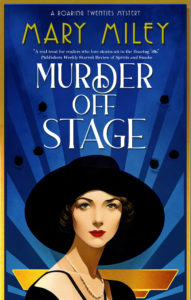 Murder Off Stage
Murder Off Stage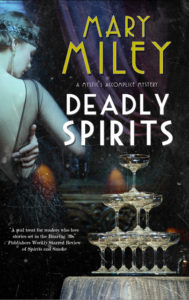


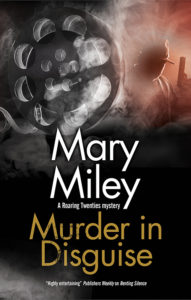
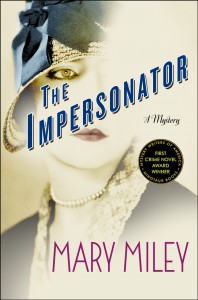
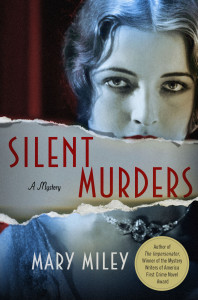


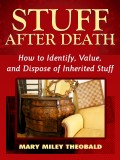





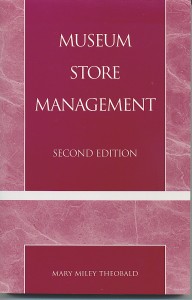

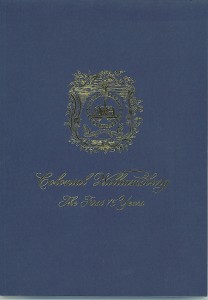





like me on Facebook follow me on twitter linkedin pinterest rss